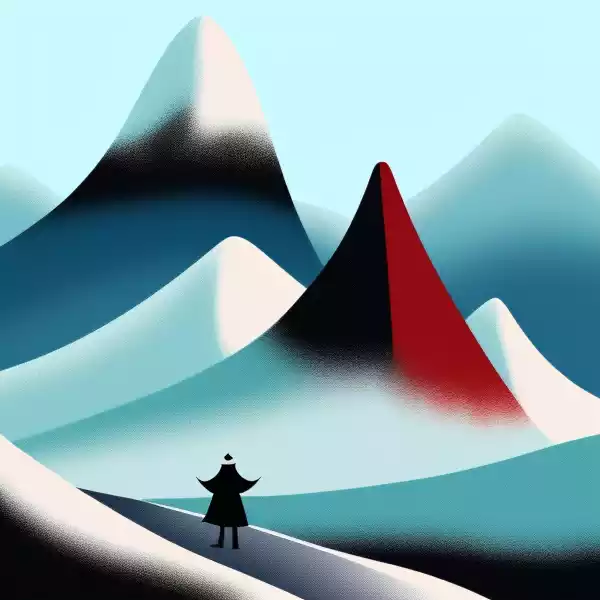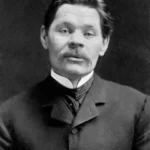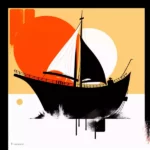 | |
In A Mountain Defile | |
| Author | Maxim Gorky |
|---|---|
| Published |
1897
|
| Language | English |
| Original Language | Russian |
| Nationality | Russian |
| Genre | Russian Literature, Socialist Realism |
1897 Short Story
In A Mountain Defile
In A Mountain Defile is an English Russian Literature, Socialist Realism short story by Russian writer Maxim Gorky. It was first published in 1897.
In A Mountain Defile
by Maxim Gorky
In a mountain defile near a little tributary of the Sunzha, there was being built a workman’s barraque– a low, long edifice which reminded one of a large coffin lid.
The building was approaching completion, and, meanwhile, a score of carpenters were employed in fashioning thin planks into doors of equal thinness, knocking together benches and tables, and fitting window-frames into the small window-squares.
Also, to assist these carpenters in the task of protecting the barraque from tribesmen’s nocturnal raids, the shrill-voiced young student of civil engineering who had been set in charge of the work had sent to the place, as watchman, an ex-soldier named Paul Ivanovitch, a man of the Cossack type, and myself.
Yet whereas we were out-at-elbows, the carpenters were sleek, respectable, monied, well-clad fellows. Also, there was something dour and irritating about them, since, for one thing, they had failed to respond to our greeting on our first appearance, and eyed us with nothing but dislike and suspicion. Hence, hurt by their chilly attitude, we had withdrawn from their immediate neighbourhood, constructed a causeway of stepping stones to the eastern bank of the rivulet, and taken up our abode beneath the chaotic grey mists which enveloped the mountain side in that direction.
Also, over the carpenters there was a foreman–a man whose bony frame, clad in a white shirt and a pair of white trousers, looked always as though it were ready-attired for death. Moreover, he wore no cap to conceal the yellow patch of baldness which covered most of his head, and, in addition, his nose was squat and grey, his neck and face had over them skin of a porous, pumice-like consistency, his eyes were green and dim, and upon his features there was stamped a dead and disagreeable expression. To be candid, however, behind the dark lips lay a set of fine, close teeth, while the hairs of the grey beard (a beard trimmed after the Tartar fashion) were thick and, seemingly, soft.
Never did this man put a hand actually to the work; always he kept roaming about with the large, rigid-looking fingers of his hands tucked into his belt, and his fixed and expressionless eyes scanning the barraque, the men, and the work as his lips vented some such lines as:
Oh God our Father, bound hast Thou A crown of thorns upon my brow! Listen to my humble prayer! Lighten the burden which I bear!
“What on earth can be in the man’s mind?” once remarked the ex- soldier, with a frowning glance at the singer.
As for our duties, my mates and I had nothing to do, and soon began to find the time tedious. For his part, the man with the Cossack physiognomy scaled the mountain side; whence he could be heard whistling and snapping twigs with his heavy feet, while the ex-soldier selected a space between two rocks for a shelter of ace-rose boughs, and, stretching himself on his stomach, fell to smoking strong mountain tobacco in his large meerschaum pipe as dimly, dreamily he contemplated the play of the mountain torrent. Lastly, I myself selected a seat on a rock which overhung the brook, dipped my feet in the coolness of the water, and proceeded to mend my shirt.
At intervals, the defile would convey to our ears a dull echo of sounds so wholly at variance with the locality as muffled hammer- blows, a screeching of saws, a rasping of planes, and a confused murmur of human voices.
Also, a moist breeze blew constantly from the dark-blue depths of the defile, and caused the stiff, upright larches on the knoll behind the barraque to rustle their boughs, and distilled from the rank soil the voluptuous scents of ace-rose and pitch-pine, and evoked in the trees’ quiet gloom a soft, crooning, somnolent lullaby.
About a sazhen [Fathom] below the level of the barraque there coursed noisily over its bed of stones a rivulet white with foam. Yet though of other sounds in the vicinity there were but few, the general effect was to suggest that everything in the neighbourhood was speaking or singing a tale of such sort as to shame the human species into silence.
On our own side of the valley the ground lay bathed in sunshine– lay scorched to the point of seeming to have spread over it a tissue-cloth. Old gold in colour, while from every side arose the sweet perfume of dried grasses, and in dark clefts there could be seen sprouting the long, straight spears and fiery, reddish, cone-shaped blossoms of that bold, hardy plant which is known to us as saxifrage–the plant of which the contemplation makes one long to burst into music, and fills one’s whole body with sensuous languor.
Laced with palpitating, snow-white foam, the beautiful rivulet pursued its sportive way over tessellated stones which flashed through the eddies of the glassy, sunlit, amber-coloured water with the silken sheen of a patchwork carpet or costly shawl of Cashmir.
Through the mouth of the defile one could reach the valley of the Sunzha, whence, since men were ther, building a railway to Petrovsk on the Caspian Sea, there kept issuing and breaking against the crags a dull rumble of explosions, of iron rasped against stone, of whistles of works locomotives, and of animated human voices.
From the barraque the distance to the point where the defile debouched upon the valley was about a hundred paces, and as one issued thence one could see, away to the left, the level steppes of the Cis-Caucasus, with a boundary wall of blue hills, topped by the silver-hewn saddle of Mount Elburz behind it. True, for the most part the steppes had a dry, yellow, sandy look, with merely here and there dark patches of gardens or black poplar clumps which rendered the golden glare more glaring still; yet also there could be discerned on the expanse farm buildings shaped like lumps of sugar or butter, with, in their vicinity, toylike human beings and diminutive cattle — the whole shimmering and melting in a mirage born of the heat. And at the mere sight of those steppes, with their embroidery of silk under the blue of the zenith, one’s muscles tightened, and one felt inspired with a longing to spring to one’s feet, close one’s eyes, and walk for ever with the soft, mournful song of the waste crooning in one’s ears.
To the right also of the defile lay the winding valley of the Sunzha, with more hills; and above those hills hung the blue sky, and in their flanks were clefts which, full of grey mist, kept emitting a ceaseless din of labour, a sound of dull explosions, as a great puissant force attained release.
Yet almost at the same moment would that hurly-burly so merge with the echo of our defile, so become buried in the defile’s verdure and rock crevices, that once more the place would seem to be singing only its own gentle, gracious song.
And, should one turn to glance up the defile, it could be seen to grow narrower and narrower as it ascended towards the mists, and the latter to grow thicker and thicker until the whole defile was swathed in a dark blue pall. Higher yet there could be discerned the brilliant gleam of blue sky. Higher yet one could distinguish the ice-capped peak of Kara Dagh, floating and dissolving amid the ( from here) invisible sunlight. Highest of all again brooded the serene, steadfast peace of heaven.
Also, everything was bathed in a strange tint of bluish grey: to which circumstance must have been due the fact that always one’s soul felt filled with restlessness, one’s heart stirred to disquietude, and fired as with intoxication, charged with incomprehensible thoughts, and conscious as of a summons to set forth for some unknown destination.
******************************
The foreman of the carpenters shaded his eyes to gaze in our direction; and as he did so, he drawled and rasped out in tedious fashion:
“Some shall to the left be sent, And in the pit of Hell lie pent. While others, holding palm in hand, Shall on God’s right take up their stand.”
“DID you hear that?” the ex-soldier growled through clenched teeth. “‘Palm in hand’ indeed! Why, the fellow must be a Mennonite or a Molokan, though the two, really, are one, and absolutely indistinguishable, as well as equally foolish. Yes, ‘palm in hand’ indeed!”
Similarly could I understand the ex-soldier’s indignation, for, like him, I felt that such dreary, monotonous singing was altogether out of place in a spot where everything could troll a song so delightful as to lead one to wish to hear nothing more, to hear only the whispering of the forest and the babbling of the stream. And especially out of place did the terms “palm” and “Mennonite” appear.
Yet I had no great love for the ex-soldier. Somehow he jarred upon me. Middle-aged, squat, square, and bleached with the sun, he had faded eyes, flattened-out features, and an expression of restless moroseness. Never could I make out what he really wanted, what he was really seeking. For instance, once, after reviewing the Caucasus from Khassav-Urt to Novorossisk, and from Batum to Derbent, and, during the review, crossing the mountain range by three different routes at least, he remarked with a disparaging smile:
“I suppose the Lord God made the country.”
“You do not like it, then? How should I? Good for nothing is what I call it.”
Then, with a further glance at me, and a twist of his sinewy neck, he added:
“However, not bad altogether are its forests.”
A native of Kaluga, he had served in Tashkend, and, in fighting with the Chechintzes of that region,had been wounded in the head with a stone. Yet as he told me the story of this incident, he smiled shamefacedly, and, throughout, kept his glassy eyes fixed upon the ground.
“Though I am ashamed to confess it,” he said, “once a woman chipped a piece out of me. You see, the women of that region are shrieking devils–there is no other word for it; and when we captured a village called Akhal-Tiapa a number of them had to be cut up, so that they lay about in heaps, and their blood made walking slippery. Just as our company of the reserve entered the street, something caught me on the head. Afterwards, I learnt that a woman on a roof had thrown a stone, and, like the rest, had had to be put out of the way.”
Here, knitting his brows, the ex-soldier went on in more serious vein:
“Yet all that folk used to say about those women, about their having beards to shave, turned out to be so much gossip, as I ascertained for myself. I did so by lifting the woman’s skirt on the point of my bayonet, when I perceived that, though she was lean, and smelt like a goat, she was quite as regular as, as–“
“Things must have been indeed terrible on that expedition!” I interposed.
“I do not know for certain, since, though men who took an actual part in the expedition’s engagements have said that they were so (the Chechintze is a vicious brute, and never gives in), I myself know but little of the affair, since I spent my whole time in the reserve, and never once did my company advance to the assault. No, it merely lay about on the sand, and fired at long range. In fact, nothing but sand was to be seen thereabouts; nor did we ever succeed in finding out what the fighting was for. True, if a piece of country be good, it is in our interest to take it; but in the present case the country was poor and bare, with never a river in sight, and a climate so hot that all one thought of was one’s mortal need of a drink. In fact, some of our fellows died of thirst outright. Moreover, in those parts there grows a sort of millet called dzhugar — millet which not only has a horrible taste, but proves absolutely delusive, since the more one eats of it, the less one feels filled.”
As the ex-soldier told me the tale colourlessly and reluctantly, with frequent pauses between the sentences (as though either he found it difficult to recall the experience or he were thinking of something else), he never once looked me straight in the face, but kept his eyes shamefacedly fixed upon the ground.
Unwieldily and unhealthily stout, he always conveyed to me the impression of being charged with a vague discontent, a sort of captious inertia.
“Absolutely unfit for settlement is this country ” he continued as he glanced around him. “It is fit only to do nothing in. For that matter, one doesn’t WANT to do anything in it, save to live with one’s eyes bulging like a drunkard’s– for the climate is too hot, and the place smells like a chemist’s shop or a hospital.”
Nevertheless, for the past eight years had he been roaming this “too hot” country, as though fascinated!
“Why not return to Riazan?” I suggested.
“Nothing would there be there for me to do,” he replied through his teeth, and with an odd division of his words.
My first encounter with him had been at the railway station at Armavir, where, purple in the face with excitement, he had been stamping like a horse, and, with distended eyes, hissing, or, rather, snarling, at a couple of Greeks:
“I’ll tear the flesh from your bones!”
Meanwhile the two lean, withered, ragged, identically similar denizens of Hellas had been baring their sharp white teeth at intervals, and saying apologetically:
“What has angered you, sir?”
Finally, regardless of the Greeks’ words, the ex-soldier had beat his breast like a drum, and shouted in accents of increased venom:
“Now, where are you living? In Russia, do you say? Then who is supporting you there? Aha-a-a! Russia, it is said, is a good foster-mother. I expect you say the same.”
And, lastly, he had approached a fat, grey-headed, bemedalled gendarme, and complained to him:
“Everyone curses us born Russians, yet everyone comes to live with us–Greeks, Germans, Songs, and the lot. And while they get their livelihood here, and cat and drink their fill, they continue to curse us. A scandal, is it not?”
*************************
The third member of our party was a man of about thirty who wore a Cossack cap over his left ear, and had a Cossack forelock, rounded features, a large nose, a dark moustache, and a retrousse lip. When the volatile young engineering student first brought him to us and said, “Here is another man for you,” the newcomer glanced at me through the lashes of his elusive eyes–then plunged his hands into the pockets of his Turkish overalls. Just as we were departing, however, he withdrew one hand from the left trouser pocket, passed it slowly over the dark bristles of his unshaven chin, and asked in musical tones:
“Do you come from Russia?”
“Whence else, I should like to know?” snapped the ex-soldier gruffly.
Upon this the newcomer twisted his right-hand moustache then replaced his hand in his pocket. Broad-shouldered, sturdy, and well-built throughout, he walked with the stride of a man who is accustomed to cover long distances. Yet with him he had brought neither wallet nor gripsack, and somehow his supercilious, retrousse upper lip and thickly fringed eyes irritated me, and inclined me to be suspicious of, and even actively to dislike, the man.
Suddenly, while we were proceeding along the causeway by the side of the rivulet, he turned to us, and said, as he nodded towards the sportively coursing water:
“Look at the matchmaker!”
The ex-soldier hoisted his bleached eyebrows, and gazed around him for a moment in bewilderment. Then he whispered:
“The fool!”
But, for my own part, I considered that what the man had said was apposite; that the rugged, boisterous little river did indeed resemble some fussy, light-hearted old lady who loved to arrange affaires du coeur both for her own private amusement and for the purpose of enabling other folk to realise the joys of affection amid which she was living, and of which she would never grow weary, and to which she desired to introduce the rest of the world as speedily as possible.
Similarly, when we arrived at the barraque this man with the Cossack face glanced at the rivulet, and then at the mountains and the sky, and, finally, appraised the scene in one pregnant, comprehensive exclamation of ” Slavno! ” [How splendid!]
The ex-soldier, who was engaged in ridding himself of his knapsack, straightened himself, and asked with his arms set akimbo:
“WHAT is it that is so splendid?”
For a moment or two the newcomer merely eyed the squat figure of his questioner–a figure upon which hung drab shreds as lichen hangs upon a stone. Then he said with a smile:
“Cannot you see for yourself? Take that mountain there, and that cleft in the mountain– are they not good to look at?”
And as he moved away, the ex-soldier gaped after him with a repeated whisper of:
“The fool!”
To which presently he added in a louder, as well as a mysterious, tone:
“I have heard that occasionally they send fever patients hither for their health.”
The same evening saw two sturdy women arrive with supper for the carpenters; whereupon the clatter of labour ceased, and therefore the rustling of the forest and the murmuring of the rivulet became the more distinct.
Next, deliberately, and with many coughs, the ex-soldier set to work to collect some twigs and chips for the purpose of lighting a fire. After which, having arranged a kettle over the flames, he said to me suggestively:
“You too should collect some firewood, for in these parts the nights are dark and chilly.”
I set forth in search of chips among the stones which lay around the barraque, and, in so doing, stumbled across the newcomer, who was lying with his body resting on an elbow, and his head on his hand, as he conned a manuscript spread out before him. As he raised his eyes to gaze vaguely, inquiringly into my face, I saw that one of his eyes was larger than the other.
Evidently he divined that he interested me, for he smiled. Yet so taken aback by this was I, that I passed on my way without speaking.
Meanwhile the carpenters, disposed in two circles around the barraque (a circle to each woman), partook of a silent supper.
Deeper and deeper grew the shadow of night over the defile. Warmer and warmer, denser and denser, grew the air, until the twilight caused the slopes of the mountains to soften in outline, and the rocks to seem to swell and merge with the bluish- blackness which overhung the bed of the defile, and the superimposed heights to form a single apparent whole, and the scene in general to resolve itself into, become united into, one compact bulk.
Quietly then did tints hitherto red extinguish their tremulous glow–softly there flared up, dusted purple in the sunset’s sheen, the peak of Kara Dagh. Vice versa, the foam of the rivulet now blushed to red, and, seemingly, assuaged its vehemence–flowed with a deeper, a more pensive, note; while similarly the forest hushed its voice, and appeared to stoop towards the water while emitting ever more powerful, intoxicating odours to mingle with the resinous, cloyingly sweet perfume of our wood fire.
The ex-soldier squatted down before the little blaze, and rearranged some fuel under the kettle.
“Where is the other man?” said he. “Go and fetch him.”
I departed for the purpose, and, on my way, heard one of the carpenters in the neighbourhood of the barraque say in a thick, unctuous, sing-song voice.
“A great work is it indeed!”
Whereafter I heard the two women fall to drawling in low, hungry accents:
“With the flesh I’ll conquer pain; The spirit shall my lust restrain; All-supreme the soul shall reign; And carnal vices lure in vain.”
True, the women pronounced their words distinctly enough; yet always they prolonged the final “u” sound of the stanza’s first and third lines until, as the melody floated away into the darkness, and, as it were, sank to earth, it came to resemble the long-drawn howl of a wolf.
In answer to my invitation to come to supper, the newcomer sprang to his feet, folded up his manuscript, stuffed it into one of the pockets of his ragged coat, and said with a smile:
“I had just been going to resort to the carpenters, for they would have given us some bread, I suppose? Long is it since I tasted anything.”
The same words he repeated on our approaching the ex-soldier; much as though he took a pleasure in their phraseology.
“You suppose that they would have given us bread?” echoed the ex- soldier as he unfastened his wallet. “Not they! No love is lost between them and ourselves.”
“Whom do you mean by ‘ourselves’?”
“Us here–you and myself–all Russian folk who may happen to be in these parts. From the way in which those fellows keep singing about palms, I should judge them to be sectarians of the sort called Mennonites.”
“Or Molokans, rather?” the other man suggested as he seated himself in front of the fire.
“Yes, or Molokans. Molokans or Mennonites– they’re all one. It is a German faith and though such fellows love a Teuton, they do not exactly welcome US.”
Upon this the man with the Cossack forelock took a slice of bread which the ex-soldier cut from a loaf, with an onion and a pinch of salt. Then, as he regarded us with a pair of good-humoured eyes, he said, balancing his food on the palms of his hands:
“There is a spot on the Sunzha, near here, where those fellows have a colony of their own. Yes, I myself have visited it. True, those fellows are hard enough, but at the same time to speak plainly, NO ONE in these parts has any regard for us since only too many of the sort of Russian folk who come here in search of work are not overly-desirable.”
“Where do you yourself come from?” The ex-soldier’s tone was severe.
“From Kursk, we might say.”
“From Russia, then?”
“Yes, I suppose so. But I have no great opinion even of myself.”
The ex-soldier glanced distrustfully at the newcomer. Then he remarked:
“What you say is cant, sheer Jesuitism. It is fellows like THOSE, rather, that ought to have a poor opinion of themselves.”
To this the other made no reply–merely he put a piece of bread into his mouth. For a moment or two the ex-soldier eyed him frowningly. Then he continued:
“You seem to me to be a native of the Don country? “
“Yes, I have lived on the Don as well.”
“And also served in the army?”
“No. I was an only son.”
“Of a miestchanin? ” [A member of the small commercial class.]
“No, of a merchant.”
“And your name–?”
“Is Vasili.”
The last reply came only after a pause, and reluctantly; wherefore, perceiving that the Kurskan had no particular desire to discuss his own affairs, the ex-soldier said no more on the subject, but lifted the kettle from the fire.
The Molokans also had kindled a blaze behind the corner of the barraque, and now its glow was licking the yellow boards of the structure until they seemed almost to be liquescent, to be about to dissolve and flow over the ground in a golden stream.
Presently, as their fervour increased, the carpenters, invisible amid the obscurity, fell to singing hymns–the basses intoning monotonously, ” Sing, thou Holy Angel! ” and voices of higher pitch responding, coldly and formally.
“Sing ye! Sing glory unto Christ, thou Angel of Holiness! Sing ye! Our singing will we add unto Thine, Thou Angel of Holiness!”
And though the chorus failed altogether to dull the splashing of the rivulet and the babbling of the by-cut over a bed of stones, it seemed out of place in this particular spot;it aroused resentment against men who could not think of a lay more atune with the particular living, breathing objects around us.
Gradually darkness enveloped the defile until only over the mouth of the pass, over the spot where, gleaming a brilliant blue, the rivulet escaped into a cleft that was overhung with a mist of a deeper shade, was there not yet suspended the curtain of the Southern night.
Presently, the gloom caused one of the rocks in our vicinity to assume the guise of a monk who, kneeling in prayer, had his head adorned with a pointed skull-cap, and his face buried in his hands. Similarly, the stems of the trees stirred in the firelight until they developed the semblance of a file of friars entering, for early Mass, the porch of their chapel-of-ease.
To my mind there then recurred a certain occasion when, on just such a dark and sultry night as this, I had been seated tale- telling under the boundary-wall of a row of monastic cells in the Don country. Suddenly I had heard a window above my head open, and someone exclaim in a kindly, youthful voice:
“The Mother of God be blessed for all this goodly world of ours!”
And though the window had closed again before I had had time to discern the speaker, I had known that there was resident in the monastery a friar who had large eyes, and a limp, and just such a face as had Vasili here; wherefore, in all probability it had been he who had breathed the benediction upon mankind at large, for the reason that moments there are when all humanity seems to be one’s own body, and in oneself there seems to beat the heart of all humanity. . . .
Vasili consumed his food deliberately as, breaking off morsels from his slice, and neatly parting his moustache, he placed the morsels in his mouth with a curious stirring of two globules which underlay the skin near the ears.
The ex-soldier, however, merely nibbled at his food–he ate but little, and that lazily. Then he extracted a pipe from his breast pocket, filled it with tobacco, lit it with a faggot taken from the fire, and said as he set himself to listen to the singing of the Molokans:
“They are filled full, and have started bleating. Always folk like them seek to be on the right side of the Almighty.”
“Does that hurt you in any way?” Vasili asked with a smile.
“No, but I do not respect them–they are less saints than humbugs, than prevaricators whose first word is God, and second word rouble.”
“How do you know that?” cried Vasili amusedly. “And even if their first word IS God, and their second word rouble, we had best not be too hard upon them, since if they chose to be hard upon US, where should WE be? Yes, we have only to open our mouths to speak a word or two for ourselves, and we should find every fist at our teeth.”
” Quite so,” the ex-soldier agreed as, taking up a square of scantling, he examined it attentively.
“Whom DO you respect?” Vasili continued after a pause.
“I respect,” the ex-soldier said with some emphasis, “only the Russian people, the true Russian people, the folk who labour on land whereon labour is hard. Yet who are the folk whom you find HERE? In this part of the world the business of living is an easy one. Much of every sort of natural produce is to be had, and the soil is generous and light–you need but to scratch it for it to bear, and for yourself to reap. Yes, it is indulgent to a fault. Rather, it is like a maiden. Do but touch her, and a child will arrive.”
“Agreed,” was Vasili’s remark as he drank tea from a tin mug. “Yet to this very part of the world is it that I should like to transport every soul in Russia.”
“And why?”
“Because here they could earn a living.”
“Then is not that possible in Russia? “
“Well, why are you yourself here?”
“Because I am a man lacking ties.”
“And why are you lacking ties?”
“Because it has been so ordered–it is, so to speak, my lot.”
“Then had you not better consider WHY it is your lot?”
The ex-soldier took his pipe from his mouth, let fall the hand which held it, and smoothed his plain features in silent amazement. Then he exclaimed in uncouth, querulous tones:
“Had I not better consider WHY it is my lot, and so forth? Why, damn it, the causes are many. For one thing, if one has neighbours who neither live nor see things as oneself does, but are uncongenial, what does one do? One just leaves them, and clears out–more especially if one be neither a priest nor a magistrate. Yet YOU say that I had better consider why this is my lot. Do you think that YOU are the only man able to consider things, possessed of a brain? “
And in an access of fury the speaker replaced his pipe, and sat frowning in silence. Vasili eyed his interlocutor’s features as the firelight played red upon them, and, finally, said in an undertone:
“Yes, it is always so. We fail to get on with our neighbours, yet lack a charter of our own, so, having no roots to hold us, just fall to wandering, troubling other folk, and earning dislike!”
“The dislike of whom?” gruffly queried the ex-soldier.
“The dislike of everyone, as you yourself have said!”
In answer the ex-soldier merely emitted a cloud of smoke which completely concealed his form. Yet Vasili’s voice had in it an agreeable note, and was flexible and ingratiating, while enunciating its words roundly and distinctly.
A mountain owl, one of those splendid brown creatures which have the crafty physiognomy of a cat, and the sharp grey ears of a mouse, made the forest echo with its obtrusive cry. A bird of this species I once encountered among the defile’s crags, and as the creature sailed over my head it startled me with the glassy eyes which, as round as buttons, seemed to be lit from within with menacing fire. Indeed, for a moment or two I stood half- stupefied with terror, for I could not conceive what the creature was.
“Whence did you get that splendid pipe?” next asked Vasili as he rolled himself a cigarette. “Surely it is a pipe of old German make?”
“You need not fear that I stole it,” the ex-soldier responded as he removed it from his lips and regarded it proudly. “It was given me by a woman.”
To which, with a whimsical wink, he added a sigh.
“Tell me how it happened,” said Vasili softly. Then he flung up his arms, and stretched himself with a despondent cry of:
“Ah, these nights here! Never again may God send me such bad ones! Try to sleep as one may, one never succeeds. Far easier, indeed, is it to sleep during the daytime, provided that one can find a shady spot. During such nights I go almost mad with thinking, and my heart swells and murmurs.”
The ex-soldier, who had listened with mouth agape and eyebrows raised even higher than usual, responded to this:
“It is the same with me. If one could only–What did you say?”
This last was addressed to myself, who had been about to remark, “The same with me also,” but on seeing the pair exchanging a strange glance (as though involuntarily they had surprised one another), had left the words unspoken. My companions then set themselves to a mutually eager questioning with respect to their respective identities, past experiences, places of origin, and destinations, even as though they had been two kinsmen who, meeting unexpectedly, had discovered for the first time their bond of relationship.
Meanwhile the black, fringed boughs of the pine trees hung stretched over the flames of the Molokans’ fire as though they would catch some of the fire’s glow and warmth, or seize it altogether, and put it out. And when, at times, their red tongues projected beyond the corner of the barraque, they made the building look as though it had caught alight, and extended their glow even to the rivulet. Constantly the night was growing denser and more stifling; constantly it seemed to embrace the body more and more caressingly, until one bathed in it as in an ocean. Also, much as a wave removes dirt from the skin, so the softly vocal darkness seemed to refresh and cleanse the soul. For it is on such nights as that that the soul dons its finest raiment, and trembles like a bride at the expectation of something glorious.
“You say that she had a squint?” presently I heard Vasili continue in an undertone, and the ex-soldier slowly reply:
“Yes, she had one from childhood upwards–she had one from the day when a fall from a cart caused her to injure her eyes. Yet, if she had not always gone about with one of her eyes shaded, you would never have guessed the fact. Also, she was so neat and practical! And her kindness–well, it was kindness as inexhaustible as the water of that rivulet there; it was kindness of the sort that wished well to all the







